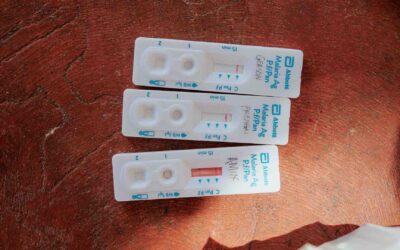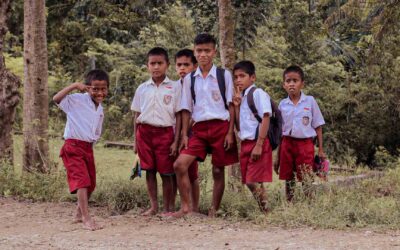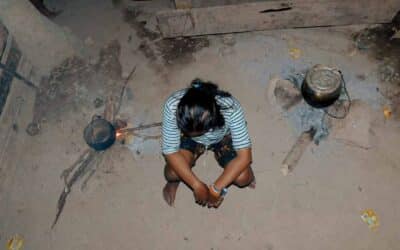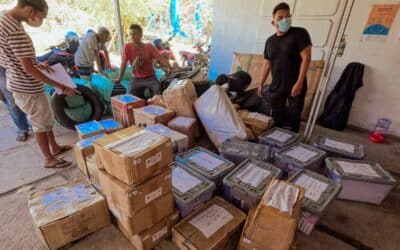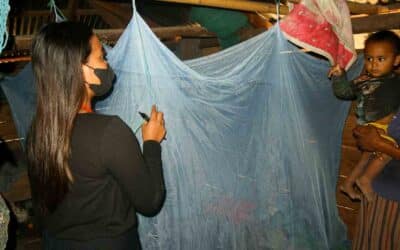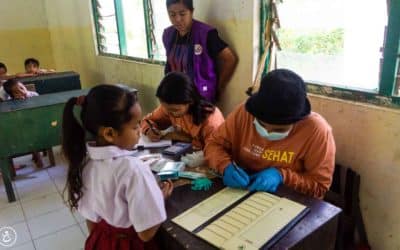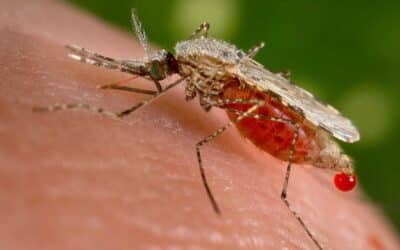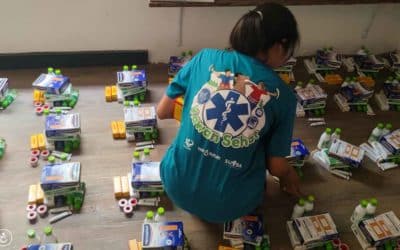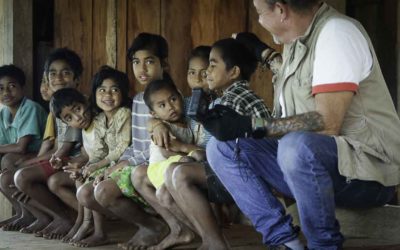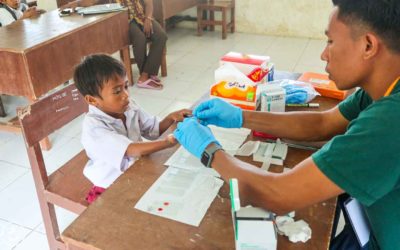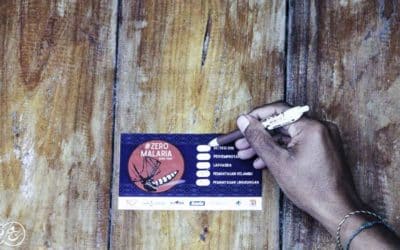During our fieldwork in Umalulu for the East Sumba Malaria Prevention Project, rapid diagnostic tests confirmed new positive malaria cases—children, women, and adolescents—despite being outside peak season. Without testing, cases remain invisible. Testing saves lives.
In the scattered hills of East Sumba, 5,300-litre ferrocement tanks collect each drop of rain. Families help build and maintain them. Children drink safely, and women no longer have to carry 20-kilo jerrycans for hours. Water near the house is a primary source of health care.
Donate
Support Care
Programs
All projects
Quick News
Field updates
Stories
Field stories
Conducting essential blood tests to detect, monitor, and treat health conditions in Indonesia’s remote villages.
Blood Donation in Rural Indonesia
In Indonesia’s remote villages, giving blood can be the only available emergency care. A single donation may save the life of a mother, child, or accident victim. In places without hospitals, your blood is their hope.
Rising TB Cases: Causes and Solutions
Tuberculosis cases are increasing in ultra-rural communities in eastern Indonesia, due to inadequate living conditions, limited access to healthcare, and malnutrition. Learn more about the disease, how it is transmitted, and Fair Future’s efforts to provide education, early detection services, and treatment support to those affected.
Donate Supplies to Support Our Projects and Communities
Supporting us is simple! You can contribute supplies at locations in Sumba, Denpasar, or Switzerland. We’re in need of educational materials, medical supplies, polio and malaria diagnostic tests, solar panels, construction tools, clothing items for children as well as books and bedding. Your donations will directly aid our ongoing programs. We appreciate your help!
14-Year-Old Girl’s Critical Medical Treatment Begins
A 14-year-old girl from Hudumburung, abandoned by her family due to poverty, has endured severe illness for years. Thanks to Kawan Sehat’s intervention, she is now undergoing essential medical tests and receiving care—her first step toward a better future. Many more children in remote regions remain without help.
Zero Malaria Program Aims to Protect 1,450 individuals
Fair Future Foundation is developing a comprehensive Malaria Prevention Project for the Umalulu region. With a focus on prevention, education, IRS spraying, and detection, we aim to significantly reduce malaria rates and ensure long-term impact through local capacity building.
Local Impact: Fighting Malaria with Prevention and Care
The Fair Future Foundation and Rotary International have launched the Zero Malaria Program to combat malaria in remote Indonesian regions. Our efforts include distributing insecticide-treated nets, conducting rapid diagnostic tests, and educating families on disease prevention. Each action taken is a step towards saving lives and creating better futures for everyone involved!
Malaria in Rural Areas: A Deadly Threat from Mosquitoes
Don’t confuse Dengue with Malaria. While Dengue is common in cities, Malaria is endemic in rural areas where we work. This photo shows the source of Malaria infection, mainly transmitted by infected female Anopheles mosquitoes. Without treatment, Malaria can become severe and fatal within 24 hours. We continue the fight through our #ZeroMalaria program.
PrimaryMedicalCare, Transforming Healthcare in Ultra-Rural Areas
In the heart of East Sumba, Fair Future Foundation’s PrimaryMedicalCare program emerges as a beacon of hope, revolutionizing healthcare access. This initiative is not just about delivering medical services; it’s about empowering local women, building resilient communities, and pioneering a sustainable healthcare model that could inspire change far beyond Indonesia’s borders.
Echoes from Lulundilu: Nine Children’s Fight Against Malaria
Amidst the rugged beauty of East Sumba’s Lulundilu, the stark reality of nine children’s daily battle with malaria unfolds. Their barefoot steps and courageous hearts reveal a narrative of resilience and hope that Fair Future Foundation is dedicated to supporting.
Detecting Malaria: Life-Saving Screenings in Rural Areas
In the remote regions of East Sumba, each blood sample tells a story of survival. Fair Future’s detection and screening initiatives are more than medical procedures; they’re gateways to a malaria-free existence. With every slide examined, we’re inching closer to a future where health prevails.
Zero Malaria: The Stickers That Save Lives in East Sumba
This New “Picture of the Day” highlights much more than a simple sticker; it reveals a crucial component of our ongoing fight against malaria. Within Fair Future’s #ZeroMalaria program, our social and medical teams dedicate their expertise and energy to affixing these stickers to the walls of homes in the villages and regions of East Sumba where we work. These stickers are not just markers but vital indicators in our overall approach to protecting and educating the most vulnerable communities.
In the remote villages of East Sumba, Indonesia, a simple sticker can mean the difference between life and death. As part of Fair Future’s Zero Malaria program, these stickers are affixed to the walls of homes, serving as a visual indicator of our comprehensive approach to malaria control.
In the battle against malaria, we don't overlook any details. From microscopic examinations to stickers on walls, every action is a step towards a malaria-free future. These stickers are not just adhesives; they are badges of education, prevention, and hope.
Family Member Detection: Early diagnosis is crucial in regions like East Sumba, where malaria is rampant. Our teams employ optical microscopic examinations to visualize plasmodia in patients' thick or thin blood smears. We also utilize Rapid Diagnostic Tests for Malaria (TDR).
Indoor Residual Spraying (PID): We conduct Indoor Residual Spraying (PID) in every home across the villages. This involves the regular application of long-lasting chemical insecticides on the inner walls of houses. The insecticide remains effective for several months, killing mosquitoes that come into contact with it.
Larvicides: Regular application of microbial or chemical insecticides to water bodies or reservoirs is another crucial aspect. The goal is to reduce the adult mosquito population by killing the immature aquatic forms, thereby limiting their development into adults.
Bed Nets: The distribution of insecticide-treated bed nets (MII) is essential in our fight against malaria. These nets have proven highly effective in reducing malaria-related deaths and illnesses.
Environmental Surveillance: We also pay close attention to the living conditions in these areas. Factors like inadequate sanitation facilities, unsanitary conditions, stagnant water, and areas where animals like pigs and water buffaloes are kept can significantly contribute to mosquito proliferation.
This is why the sticker takes on such importance. It informs villagers whether a particular home has been treated, whether its inhabitants have undergone screening and whether they have been educated on protecting themselves from the disease.
Thank you very much for your support.
Alex Wettstein – Fair Future Foundation medico-social camp in East Sumba – Rumah Kambera, Lambanapu, 5th of October, 2023.



